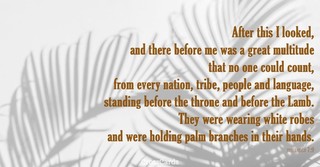- Recent Translations
- All Translations
Revelation 7:13
Share
Settings
Revelation 7:13 in Other Translations
Revelation 7:13 Meaning and Commentary
And one of the elders answered, saying unto me
This elder was not the Apostle Peter, as some Popish interpreters have thought; and still less Pope Silvester, who lived in the times of Constantine; be is much more likely, according to others, to be Constantine himself, the first of the elders, or the chief magistrate when the church sprung out of its troubles, and enjoyed rest and peace; though some have thought of the prophet Isaiah, since many things said by this elder are to be found in his prophecy; compare ( Revelation 7:14 Revelation 7:16 Revelation 7:17 ) ; with ( Isaiah 1:18 ) ( 49:10 ) ( 25:8 ) ; but it is needless to inquire who the particular person was; it is enough to say, that he was one of the four and twenty elders about the throne, one that belonged to the church, perhaps the same as in ( Revelation 5:5 ) ; who, in a visionary way, is represented as accosting John upon the above sight. The word "answered" is a common Hebraism of the New Testament, which is often used when nothing goes before, to which a return is made; and only signifies here, that the elder opened his month, began to speak, and called to John, and said as follows:
what are these which are arrayed in white robes? and whence came
they?
This he said, not as being ignorant of them, or of the reason of their being clothed in this manner, nor of the place and state from whence they came, as appears by the account afterwards given of them by him; but to stir up John to take more notice of them, as being a body of men that were worthy of observation and contemplation, and were worth his while to consider well who they were, and from whence they came; and also to try him whether he knew them or not, and to bring him to a confession of his ignorance; and that he might have an opportunity of giving him some hints about them, which might be useful to him, and to the churches, and for the explanation of this vision, and other parts of this prophecy.
Revelation 7:13 In-Context
Cross References 1
-
1.
S
Revelation 3:4
